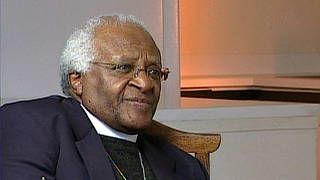
Guests
- Lumumba Stanislaus Di-Apingthe Sudanese chair of the group of 132 developing countries known as G77.
The UN climate talks are in disarray here in Copenhagen after developing countries reacted furiously to leaked documents that show world leaders will next week be asked to sign an agreement that hands more power to rich countries and sidelines the UN’s role in all future climate change negotiations. Moments before we went on the air, Lumumba Stanislaus Di-Aping, the Sudanese chair of the group of 132 developing countries known as G77, condemned the leaked document. [includes rush transcript]
Transcript
AMY GOODMAN: We’re broadcasting live from Copenhagen. This is Climate Countdown.
YVO DE BOER: Time is up. Over the next two weeks, governments have to deliver a strong and long-term response to the challenge of climate change.
MOHAMED AXAM MAUMOON: All those countries are suffering to the point that we can’t see the end of it, because the mistakes other countries are making, for the mistakes that you are — that many people don’t try to redeem themselves from. And it’s as good as killing us off.
AMY GOODMAN: This is Climate Countdown. We’re broadcasting live from Copenhagen. I’m Amy Goodman, joined by Democracy Now!’s Anjali Kamat.
ANJALI KAMAT: Welcome, everyone. We’re here in the Bella Center in Copenhagen.
The UN talks here are in disarray after developing countries reacted furiously to leaked documents that show world leaders next week will be asked to sign an agreement that hands more power to rich countries and sidelines the UN’s role in all future climate change negotiations.
The secret draft agreement was leaked to The Guardian newspaper, which broke the story yesterday afternoon. The document also sets unequal limits on per capita carbon emissions for developed and developing countries in 2050, meaning that people in rich countries would be permitted to emit nearly twice as much as those in poor countries.
The Guardian reports the document, known as the “Danish text,” was worked on by a group of individuals known as the “circle of commitment.” It is understood to include the Britain — to include Britain, the United States and Denmark and has only been shown to a handful of countries since it was finalized this week.
The head of the UN climate talks, Yvo de Boer, downplayed the significance of the leaked document, saying, quote, “This was an informal paper ahead of the conference given to a number of people for the purposes of consultations. The only formal texts in the UN process are the ones tabled by the Chairs of this Copenhagen conference at the behest of the Parties.”
Moments before we went on the air, Lumumba Stanislaus Di-Aping addressed the controversy. He is the Sudanese chair of the group of 132 developing countries known as G77 and China.
LUMUMBA STANISLAUS DI-APING: …is that this text, the Danish text, is an extremely dangerous document for developing countries. It is a total violation of the principles of transparency and openness. It is a rejection of the fact that the UNFCCC is the only legitimate forum for conducting negotiations by parties to the convention. And in terms of substance, it is a fundamental rejection and reworking of the [UNFCCC] balance of obligations between developing and developed countries.
Not only that, it’s our humble view it’s equally an insult to the elected president of COP15. This text comes from the office of the Prime Minister of Denmark. It’s overreaching. The strategic goal is to destroy the balance of obligations between developing and developed, industrialized Western countries. And this is done by and with a zealous rejection of the notion of common but differentiated responsibilities and respective capabilities. And further, it denies the fact that developed countries have a historical responsibility for damaging the atmospheric space, which is something started and has been continuing for the last — over last 200 years.
AMY GOODMAN: Lumumba Stanislaus Di-Aping addressing the controversy of the so-called Danish text.













Media Options